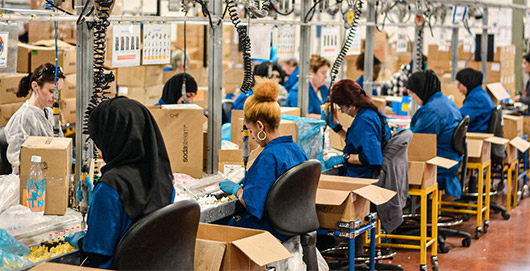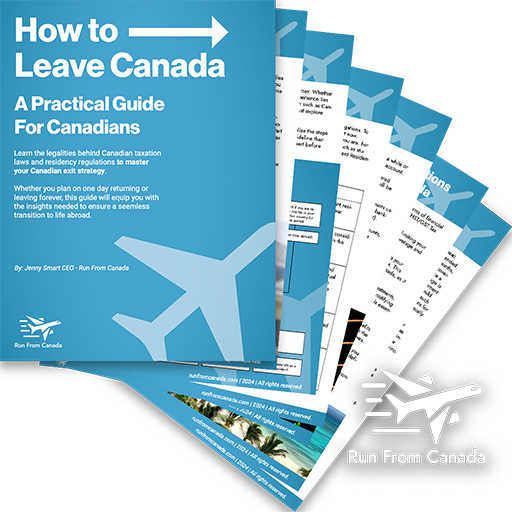How Big Business is Squeezing Canadians and Everyone Else
Every day, it feels like the average Canadian’s wallet gets a little lighter. With housing costs soaring and grocery bills climbing, just making ends meet here has become a major task. The financial pinch is felt not only by long-term residents but also by many newcomers to Canada chasing the “Canadian dream.”
So, who’s behind this economic tight squeeze? Look no further than Canada’s big businesses.
In this article, I’m going to uncover how the largest corporations in Canada have been orchestrating a multi-pronged assault on the livelihoods of both immigrants and working-class Canadians. These big boys manipulate immigration policies, engage in monopolistic business practices, and enforce unwarranted price hikes on Canada’s most vulnerable.
We’ll delve into how these big business strategies impact wages, inflate consumer prices, and stifle market competition. My goal here is not to bash business in Canada, but to show you how Canada’s biggest business play a role in enriching their shareholders while diminishing the quality of life for Canadians.
Tactic 1: Wage Suppression Through Immigration
Big businesses have long advocated for increased immigration as a means to boost Canada’s economy. On the surface, this seems like a noble goal. However, further examination reveals their agenda is less than altruistic.

A research article by George J. Borjas shows that recent immigrants are often willing to work for lower wages, especially in low-skilled occupations. A factor that’s being exploited in the Canadian immigration system.
With a ready supply of cheaper labour just a policy change away, is it any wonder why industry heavyweights lobby the government so fervently for more immigration?
- Statistics Canada data indicates real wages have grown only 0.8% annually nationwide since 1997, yet immigrant populations have swelled by over 150% in that time.
- A recent poll found that over half of newcomers to Canada feel they are overqualified for their jobs and underpaid compared to similarly experienced Canadian-born peers.
No doubt, the corporate bottom line benefits greatly from this influx of value-seeking job applicants. But at what cost?
With wage growth stagnant for decades, the average Canadian worker has gained little despite a supportive immigration system.
Of course, one would be remiss not to acknowledge the contributions of immigrants who power many sectors of the economy. A restaurant manager in Ontario notes, “Many of my hardworking staff are stuck in low-paying positions due to lack of Canadian experience or credentials being recognized. Meanwhile, the shareholders seem pretty happy.”
It appears the primary beneficiaries of immigration are those at the very top who see only dollars, not people. As workers and businesses alike reap rewards, big corporations really “take the cake” by suppressing wages and inflation-proofing profits.
Tactic 2: Consumer Price Increases: The Hidden Cost of Corporate Greed
It’s no secret that the cost of living in Canada has grown substantially in recent decades. But while politicians and pundits often blame temporary factors, many Canadians are starting to notice the connection between rising corporate profits and their own emptying wallets.

According to Statistics Canada, the Consumer Price Index (CPI) rose 6.8% annually in 2022, the highest increase since 1982. The main drivers of this inflation were food, shelter, and transportation, which account for over half of the CPI basket.
Take the grocery industry, for instance. According to the Department of Agriculture, over the past 20 years, the average Canadian family of four has seen their supermarket bills grow by over 70%. Yet, during this same period:
Funny coincidence, isn’t it? The more our grocery bills climb, the more the corporate elites seem to enjoy their financial ascent. The yawning gap between executive compensation and the struggles of everyday Canadians prompts a wry acknowledgment of the disparities in our economic landscape.
The reality is that without meaningful competition, companies face few consequences for padding their bottom line at the expense of consumers. Countless industries like telecom, air travel, and gasoline have followed a similar trajectory of consolidation, leading to costs that just keep on rising.
As costs rise without wage growth to match, more Canadians are feeling the squeeze. Janet, a single mother of two from Toronto, notes, “Everything is becoming a struggle as my income stays the same, but prices go up and up each year. I never thought groceries would become a luxury.” Who really pays the price for corporate greed? Definitely not those at the top raking in the dough.
It’s time to challenge the myth that inflation is inevitable and beyond our control. It’s time to expose the hidden link between corporate greed and consumer pain. It’s time to demand a fairer and more competitive economy that works for everyone, not just the few.
Tactic 3: Monopolistic Practices in Canada’s Big Industries
It’s hardly a revelation that several of Canada’s largest sectors—telecommunications, air travel, and banking—are dominated by a few oversized players, making many Canadians jump when they tell them to. These industries have morphed into monopolies or tight oligopolies, where a handful of corporations control significant market shares, thereby influencing everything from pricing to service quality.

Take the telecom sector, for example: Rogers, Bell, and Telus together command over 90% of the cell phone and internet subscriber base across the country. This near-total dominance allows them to set some of the highest prices globally, without consequences. A report by the Organization for Economic Co-operation and Development (OECD) underscored this, ranking Canada 32nd out of 36 countries for wifi affordability.
The lack of Canadian competition stifles innovation and often results in subpar service quality, frequent network outages, sluggish speeds, and poor customer support.
Similarly, in the realm of air travel, Air Canada and Westjet enjoy a duopoly, possessing over 95% of the seating capacity. Their market stronghold, fortified by acquiring smaller competitors, has led to dramatic increases in domestic flight costs—jumping 100-300% in the past decade. Research by Travel Off Path confirms this disparity, noting that Canadians pay on average 100% more for domestic flights compared to Americans.
The exorbitant costs significantly curb mobility for many, particularly those in remote or northern areas, and the duopoly further diminishes consumer choice and satisfaction with limited travel options, frequent delays, and an array of hidden charges.
These monopolistic practices not only deepen the economic divide but also push more Canadians into the category of “working poor,” as they grapple with high costs and limited choices.
With competition stifled and oversight lacking teeth, is it any wonder why many feel like captives in their own country?
The Impact Canadian Big Business Has on Immigrants and Canadians
While corporate influences have made life increasingly difficult for all Canadians, immigrants frequently find themselves doubly disadvantaged. Language barriers, credential challenges and cultural adjustments compound the struggle to survive in an economy rigged against ordinary workers.
- New stories abound of skilled newcomers driving Ubers or working minimum wage jobs despite graduate degrees, due simply to lack of “Canadian experience” and lack jobs hiring in Canada.
However, the impacts of wage suppression, inflated costs of living and constrained opportunities are uniting Canadians of all backgrounds in financial hardship.
Whether immigrant or lifelong resident, the realities of 21st-century Canada seem to be a far cry from the comfortable middle-class lifestyle once attainable for many through honest work.

The pervasive influence of corporate giants in Canada is making life increasingly tough for everyone, exacerbating the struggle to secure a foothold in an economy that seems stacked against ordinary workers.
It’s a common narrative now: highly skilled newcomers, even those with advanced degrees, find themselves driving for ride-sharing services or working minimum-wage jobs. The primary barrier? The elusive requirement of “Canadian experience” and a scarcity of available positions that acknowledge their qualifications.
Gone are the days when steady, honest work assured a comfortable middle-class life. As large corporations tighten their grip on the national economy, the divide widens, leaving workers, both new and native, struggling to keep pace with an ever-evolving economic landscape.
Understanding The Great Canadian Exodus
As livelihoods become harder to sustain, more Canadians are choosing to seek opportunities elsewhere. Official statistics show a significant rise in emigration over the past decade, with over 100,000 more people leaving the country annually than in the late 90s.
- Staggering numbers of educated youth are bolting for countries with stronger job markets like the U.S., U.K. and Australia (RBC, 2023).
- Industries from healthcare to technology are crying out for skilled labour, yet both wages and housing costs deter many from remaining in Canada long-term.
Clearly, this “brain drain” will have crippling long-term effects on our workforce and tax base for generations. With fewer talents choosing to study, work and raise families here due to dismal affordability, economic growth will stall, which we’re seeing already.
Broader Economic Consequences For Middle and Working Class Canadians
Whether it be wage suppression, inflationary pricing or monopolization, their effects reach beyond individuals. These corporate maneuvers threaten the very foundation of Canada’s economy and social construct. In fact, if you thought things will get better in Canada, you must wake up soon. Please note that:
- With Canadian consumption lowered by stagnant incomes, domestic growth will inevitably slow as fewer can participate freely.
- As falling tax revenues fail to cover rising health and social costs from growing inequality, public services and infrastructure face deficits and decline in quality.
- Entrepreneurship is quashed as startups cannot compete against giants controlling entire sectors through predatory pricing.
Wrapping Up – How You Can Escape Canadian Monopolies
You can see how decades of prioritizing corporate interests over middle-class prosperity in Canada’s economic landscape is hurting the livelihoods of its workers – the people who make up the whole system. From immigrant exploitation to anti-competitive tactics – it’s clear that regular people continue shouldering the costs for a system rigged against them.
However, although confronting such powerful forces represents a monumental task, turning a blind eye will only deepen national troubles in the years to come. That said, if you’re looking to escape the sentence of wage slavery many Canadian’s face, you still have options and we reveal them all in our Escaping Canada Guide.

Explore Your Opportunities Abroad
Use the Canadian Exit Guide to see how you can leave Canada to find better opportunities abroad.
We’ve made it our goal to help Canadians start their Canadian dream beyond the borders of Canada. And if you’re looking to escape we’re here to walk you through it.

Leave a Reply